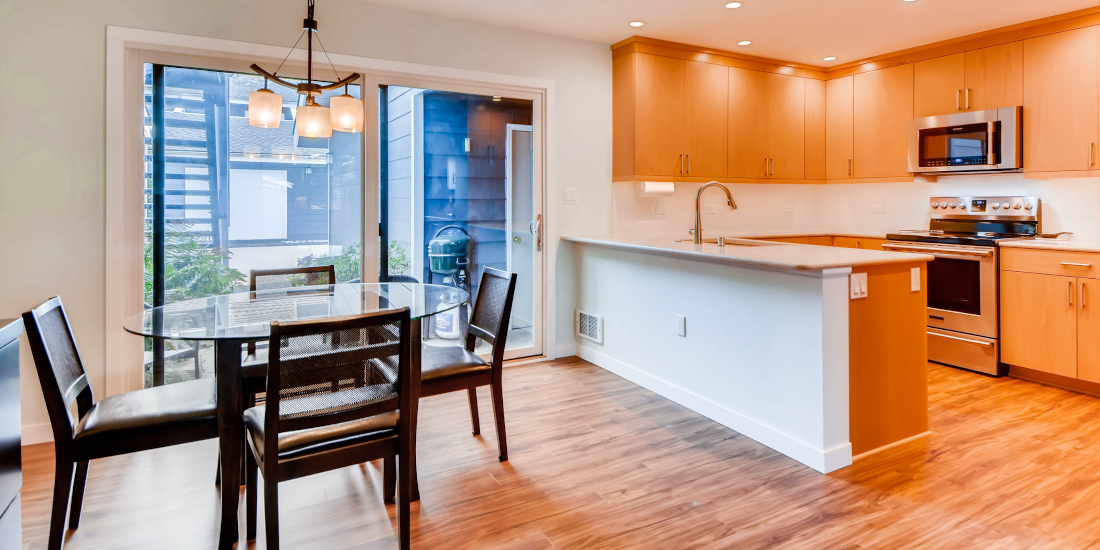
Q: I’m looking to remodel several rooms, including my kitchen, bathroom, foyer, staircase, and living room. Is there one flooring product that can handle all these heavily trafficked, potentially wet spaces?
A: In the past, flooring options were limited to carpet, vinyl, hardwood, tile, or laminate, each with their distinct pros and cons. But there’s a new product that can serve all these rooms: luxury vinyl plank (LVP) or luxury vinyl tile (LVT).
LVP doesn’t have a very provocative name, and many homeowners remain unaware of it even after seeing it many times at the home store. But LVP is superior to laminate flooring products of the past.
Here’s why:
- LVP is affordable. You can buy LVP for $3–7 per square foot. Spending more will get you a thicker protective topcoat, but you can get a great floor in a wide variety of styles for under $5 per square foot. A word of warning: don’t be seduced by $.96 per foot “blowout” prices—if it seems too good to be true, it probably is.
- It comes in a wide variety. LVP offers seemingly endless options, from wood plank to large-format tile. It has a wide variety of textures, including stone and different types of wood. Up close, the look and feel of wood or stone varieties is uncannily realistic.
- It’s durable. LVP is well-suited for wet areas such as kitchens, bathrooms, and basements. In homes with pets and small children, LVP resists scratching, foot traffic, and spills. It won’t chip or crack like tile if you drop a dish on it. Most LVP products come with at least a 10-year topcoat wear layer.
- It's versatile. There are a few different installation options. LVP clicks together easily and can be glued down or float over the existing subfloor. Some products can even be glued down and grouted to mimic traditional tile!
- It’s comfortable. LVP is soft underfoot, absorbs pressure, and has sound-deadening properties. This makes it a great solution for stairs, multi-floored homes, or the kid’s playroom. Some products are even designed to overlay radiant heat mats—the ultimate in bathroom luxury.
- It’s easy. LVP is relatively easy to install, doesn’t retain dust like carpet, and usually cleans up nicely with just soap and water.
There are some minor drawbacks you’ll want to know about before jumping into LVP:
- LVP lacks longevity. LVP is a one-trick pony and can’t be refinished. Within 10–20 years you’ll need to replace it.
- It requires substrate prep. The subfloor under LVP needs to be smooth and level. Unlike carpet, which can be installed over uneven basement concrete, LVP will shift and buckle if the floors are uneven.
- Warranties vary. You get what you pay for, so research the manufacturer’s warranty and specifications. Low-end products will feature topcoat protection layers with warranties under 10 years. And again, beware of blowout prices.
- Installation isn’t always easy. As mentioned above, LVP is generally easy to install. But in a home with nooks and crannies, installation can get complicated. Tying it into uneven floor transitions requires some skill and patience. Tricky floorplans will require that you order extra to cover the cut waste. In short, some projects are best left to the professionals.
The wonderful thing about the remodeling industry is the constant improvement in materials. LVP outperforms its predecessors without sacrificing style. To learn more about this wonderful product, Google search “LVP” or “LVT flooring” or contact a local remodeling contractor. Let the design fun begin!
Joe Reed is director of sales and marketing at Home Run Solutions, a member of the Master Builders Association of King and Snohomish Counties (MBAKS). If you have a home improvement, remodeling, or residential homebuilding question you’d like answered by one of MBAKS’ more than 2,700 members, write to homework@mbaks.com.